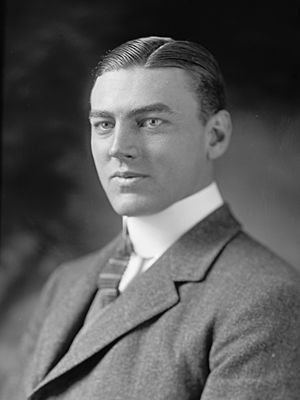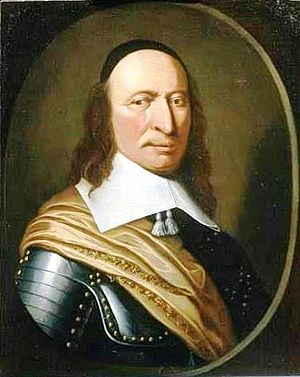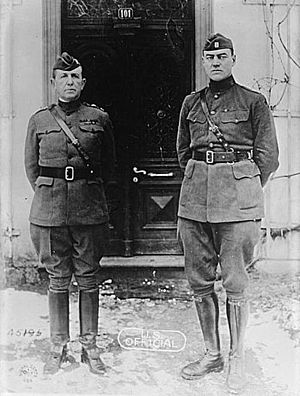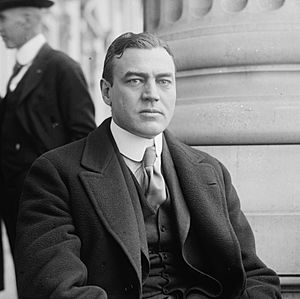Hamilton Fish III facts for kids
Quick facts for kids
Hamilton Fish III
|
|
|---|---|
 |
|
| Member of the U.S. House of Representatives from New York's 26th district |
|
| In office November 2, 1920 – January 3, 1945 |
|
| Preceded by | Edmund Platt |
| Succeeded by | Peter A. Quinn |
| Member of the New York State Assembly from the Putnam district |
|
| In office January 1, 1914 – December 31, 1916 |
|
| Preceded by | John R. Yale |
| Succeeded by | John P. Donohoe |
| Personal details | |
| Born |
Hamilton Stuyvesant Fish
December 7, 1888 Garrison, New York, U.S. |
| Died | January 18, 1991 (aged 102) Cold Spring, New York, U.S. |
| Political party | Progressive (1912–16) Republican (after 1920) |
| Spouses |
Grace Chapin
(m. 1920; died 1960)Marie Blackton
(m. 1967; died 1974)Alice Desmond
(m. 1976; div. 1984)Lydia Ambrogio
(m. 1988) |
| Relations | Hamilton Fish (grandfather) Hamilton Fish V (grandson) Nicholas Fish II (uncle) Stuyvesant Fish (uncle) |
| Children | Hamilton Fish IV Lillian Veronica Fish Elizabeth Fish |
| Parents | Hamilton Fish II Emily Mann |
| Alma mater | Harvard University (BA) |
| Military service | |
| Allegiance | |
| Branch/service | United States Army |
| Years of service | 1917–1919 |
| Rank | |
| Commands | Company K, 369th Infantry, 93d Division |
| Battles/wars | World War I
|
| Awards |
|
Hamilton Fish III (born Hamilton Stuyvesant Fish; December 7, 1888 – January 18, 1991) was an American soldier and politician from New York State. He came from a family that had been active in New York politics for a long time. He served in the United States House of Representatives from 1920 to 1945. During his time in Congress, he was known for opposing the United States getting involved in foreign wars. He was also a strong critic of President Franklin D. Roosevelt. When Fish turned 102 in 1990, he was the oldest living American who had served in Congress.
Contents
Family and Early Life

Hamilton Stuyvesant Fish was born in Garrison, New York. His father, Hamilton Fish II, was a Republican U.S. Representative. His mother was Emily Mann. His grandfather, Hamilton Fish, was the United States Secretary of State under President Ulysses S. Grant.
The Fish family had a long history in New York. Hamilton Fish III's great-great-grandfather, Nicholas Fish, was an officer in the Continental Army. Nicholas Fish's wife, Elizabeth Stuyvesant, was a descendant of Peter Stuyvesant. Peter Stuyvesant was the Dutch colonial governor of New York.
Hamilton Fish III's parents changed his name from Hamilton Stuyvesant Fish to just Hamilton Fish. This was to honor a cousin, also named Hamilton Fish, who died in the Spanish–American War.
In 1921, Fish married Grace Chapin Rogers. They had a son, Hamilton Fish IV, who also became a U.S. Representative. Their daughter, Lillian Veronica Fish, married David Whitmire Hearst.
Education and Sports
As a child, Fish went to school in Switzerland, where he learned French and played soccer. He also spent summers in Bavaria. He later attended Fay School and St. Mark's School in Massachusetts. He described himself as a "B student" but was very good at sports.
Fish graduated from St. Mark's in 1906. He then went to Harvard College, graduating in 1910. At Harvard, he was a successful football player. He played as a tackle and was named an All-America player twice. In 1954, he was inducted into the College Football Hall of Fame.
He graduated early from Harvard with a degree in history and government. He then attended Harvard Law School but left before finishing. He took a job in an insurance office in New York City.
Before serving in the U.S. Congress, Fish was a member of the Progressive Party. He served in the New York State Assembly for Putnam County from 1914 to 1916.
Military Service in World War I

Before the United States entered World War I, Fish was a captain in the 15th New York Infantry. This unit was later renamed the 369th Infantry. It was known as the "Harlem Hellfighters" and was made up of African American enlisted men.
In 1917, Fish and his unit began training. They sailed to France in December 1917. The 369th Infantry was placed under the control of the French army. They spent 191 days on the front lines, which was the longest of any American regiment. They were also the first Allied regiment to reach the Rhine River.
For his service, Fish received the Silver Star and the French War Cross 1914–1918. He was also inducted into the French Legion of Honor.
Fish was promoted to major in March 1919. He returned to the United States in April 1919 and was discharged from the Army in May. He continued to serve in the Officers' Reserve Corps and reached the rank of colonel.
Service in the U.S. Congress

Hamilton Fish was elected to the U.S. House of Representatives on November 2, 1920. He served until January 3, 1945. During his nearly 25 years in Congress, Fish became known for his strong opposition to communism. He was also a vocal critic of President Franklin D. Roosevelt.
Fish was against Roosevelt's New Deal programs. He also believed the U.S. should not get involved in foreign conflicts until after the attack on Pearl Harbor. On December 8, 1941, he gave the first speech in Congress asking for a declaration of war against Japan.
In 1944, Fish lost his bid for re-election. After his defeat, he said he had no regrets. He believed he had fought hard to stop what he saw as a move toward communism in America.
Tomb of the Unknowns
On December 21, 1920, Fish introduced a resolution in Congress. This resolution called for bringing the remains of an unknown American soldier from World War I back to the U.S. The soldier would be buried in a special tomb at Arlington National Cemetery in Arlington, Virginia. Congress approved his idea in March 1921.
The unknown soldier was chosen in France and brought back to the U.S. He was buried at Arlington on November 11, 1921. The tomb, completed in 1937, is now known as the Tomb of the Unknowns. It is guarded 24/7 by the 3rd Infantry Regiment of the U.S. Army. This tomb is considered a very important military site in the United States.
The Fish Committee
Hamilton Fish was a strong opponent of communism. In 1930, he proposed creating a committee to investigate communist activities in the United States. This committee became known as the Fish Committee. It looked into many people and groups suspected of being involved with or supporting communism.
The committee suggested giving the U.S. Department of Justice more power to investigate communists. They also recommended stronger immigration laws to keep communists out of the country.
In 1933, Fish was part of a group that supported publishing an English translation of a German book. The book, called Communism in Germany, was written by Adolf Ehrt. The committee stated they published it to show how Germany dealt with communism, not to support other controversial ideas in the book. Fish and the other committee members later distanced themselves from the book due to its unpopular views.
Views on Foreign Policy
Fish was known for his "non-interventionist" views. This meant he believed the U.S. should not get involved in other countries' conflicts. He was sometimes called "the Nation's No. 1 isolationist."
In 1939, Fish met with Joachim Ribbentrop, a German official, in Norway. Fish hoped to improve relations with Germany. He also spoke at a rally in Madison Square Garden in 1938.
In 1941, an investigation looked into the activities of German agents in the U.S. It was found that Fish's chief of staff, George Hill, had close ties to George Sylvester Viereck, a German propaganda agent. Hill was later convicted of perjury (lying under oath). Fish defended Hill, saying he was a good person who was against the U.S. getting involved in war.
After the attack on Pearl Harbor in December 1941, Fish gave a speech in Congress. He called for unity and support for the President in the war effort. However, in his autobiography, he later said he was "ashamed of my remarks."
Civil Rights Advocacy
Fish was a supporter of civil rights for African Americans, especially in the military. He worked with other politicians to pass anti-lynching bills three times (1922, 1937, and 1940). These bills passed the House of Representatives but were blocked in the Senate.
In 1940, he added an amendment to the Military Appropriations Bill. This amendment banned racial discrimination in the selection and training of military personnel. This was an important step towards ending segregation in the military.
Fish believed that African Americans should have the same rights as other Americans to serve and fight in the military. He spoke about this, connecting it to President Roosevelt's idea of "Four Freedoms."
Later Political Challenges
In the 1940 and 1942 elections, groups worked to defeat Fish because of his non-interventionist views. They raised money for his opponents and created media attacks. Fish won in 1940 and 1942, but with smaller margins.
In 1944, his congressional district was changed. He ran in a new district that no longer included his home county. He lost the election to Augustus W. Bennet. After his defeat, Fish claimed that "Communistic and Red forces" and a large amount of money were responsible. He also sued a group for libel, claiming they depicted him as a Nazi sympathizer, but he later dropped the lawsuit.
Later Life and Legacy
After leaving Congress, Fish continued to share his views. In 1981, he appeared in the film Reds, which was about the life of journalist John Reed during the Russian Revolution.
In his autobiography, Fish expressed support for NATO and U.S. military actions in Panama and Grenada. He also criticized the Vietnam War.
Hamilton Fish III died in Cold Spring, New York, on January 18, 1991, at the age of 102. He was buried at Saint Philip's Church Cemetery in Garrison, New York.
Ancestors and Descendants
Hamilton Fish III was the third person in his direct family line named Hamilton Fish. Like his father and son, he was often known as Hamilton Fish Jr. during his time in Congress. His grandson, also named Hamilton Fish, was a publisher and ran for Congress as "Hamilton Fish Jr." in 1994. This grandson is also known as Hamilton Fish V.
Works
Books
- The Red Plotters. New York: Domestic and Foreign Affairs Publishers (1947).
- Lafayette in America During and After the Revolutionary War and Other Essays on Franco-American Relations. New York: Vantage Press (1976).
- Tragic Deception: FDR and America's Involvement in World War II. Old Greenwich, Conn.: Devin-Adair (1983).
- Hamilton Fish: Memoir of an American Patriot. Chicago: Regnery Publishing (1991).
|
 | James Van Der Zee |
 | Alma Thomas |
 | Ellis Wilson |
 | Margaret Taylor-Burroughs |

